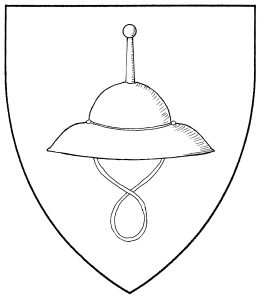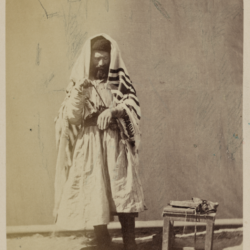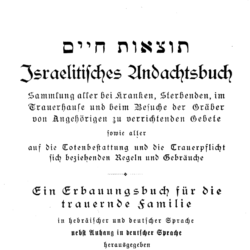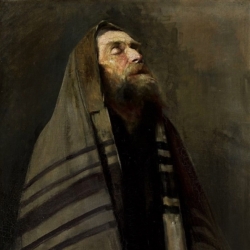| Source (Hebrew) | Translation (English) |
|---|---|
אָדָם שֶׁהוּא דָּר בַּכְּפָר וְאֵין עִמּוֹ עֲשָׂרָה לוֹמַר דָּבָר שֶׁבִּקְדֻשָּׁה אוֹ בִּמְּקוֹם קְּהִלָּה וְאִחֵר לָבֹא עַד אֲשֶׁר אָמְרוּ כְּבָר יְהֵא שְׁמֵי׳ רַבָּא יֹאמַר |
A person who lives in a village without a minyan or who arrived late after they had already said “may God’s great Name…” should instead say: |
וְעַתָּה יִגְדַּל נָא כֹּחַ אֲדֹנָי כַּאֲשֶׁר דִבַּרְתָּ לֵאמֹר׃ (במדבר יד:יז). |
Therefore, I pray, let my Lord’s forbearance be great, as you have declared, saying:[1] Numbers 14:17. |
וְהִתְגַּדִּלְתִּי וְהִתְקַדִּשְׁתִּי וְנוֹדַעְתִּי לְעֵינֵי גּוֹיִם רַבִּים וְיָדְעוּ כִּי אֲנִי ה׳׃ (יחזקאל לח:כג). |
Thus will I manifest My greatness and My holiness, and make Myself known in the sight of many nations. And they shall know that I am YHVH.[2] Ezekiel 38:23. |
יְהִי שֵׁם ה׳ מְּבֹרָךְ מֵעַתָּה וְעַד עוֹלָם׃ (תהלים קיג:ב). |
Let the name YHVH be blessed now and forever.[3] Psalms 113:2. |
This mourners ḳaddish in the event there is no minyan is found in the Sefer Ḥasidim of Rabbi Yehudah ben Shmuel of Regensburg (ca. 12th-13 c.).
Source(s)
Needing source images.

“קדיש יתום ליחיד | Mourner’s Ḳaddish for an Individual Without a Minyan (Sefer Ḥasidim, ca. 12-13th c.)” is shared through the Open Siddur Project with a Creative Commons Public Domain Dedication 1.0 Universal license.







Leave a Reply